|
|
|
Sort Order |
|
|
|
Items / Page
|
|
|
|
|
|
|
| Srl | Item |
| 1 |
ID:
140323
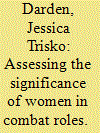

|
|
|
|
|
| Summary/Abstract |
What should we know about the roles of women in armed conflicts? I review the existing literature on women’s roles in regular and irregular conflicts to identify gaps in our understanding of the significance of female combatants. I draw on contemporary and historical cases of women’s combat participation across world regions and, in so doing, I challenge existing assumptions about the limits of women’s participation in armed conflict. Examining women as a group and expecting conflict to affect this group in predictable and easily identifiable ways only reinforces existing assumptions about women and war. To understand the range of motivations underlying women’s decisions to fight or to not fight, we should give greater attention to opportunity structures and other social conditions rather than simply assuming that women have different incentives than men.
|
|
|
|
|
|
|
|
|
|
|
|
|
|
|
|
| 2 |
ID:
171339
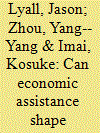

|
|
|
|
|
| Summary/Abstract |
Governments, militaries, and aid organizations all rely on economic interventions to shape civilian attitudes toward combatants during wartime. We have, however, little individual-level evidence that these “hearts and minds” programs actually influence combatant support. We address this problem by conducting a factorial randomized control trial of two common interventions—vocational training and cash transfers—on combatant support among 2,597 at-risk youth in Kandahar, Afghanistan. We find that training only improved economic livelihoods modestly and had little effect on combatant support. Cash failed to lift incomes, producing a boom-and-bust dynamic in which pro-government sentiment initially spiked and then quickly reversed itself, leaving a residue of increased Taliban support. Conditional on training, cash failed to improve beneficiaries’ livelihoods but did increase support for the Afghan government for at least eight months after the intervention. These findings suggest that aid affects attitudes by providing information about government resolve and competence rather than by improving economic livelihoods.
|
|
|
|
|
|
|
|
|
|
|
|
|
|
|
|
| 3 |
ID:
103432
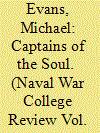

|
|
|
| 4 |
ID:
178500
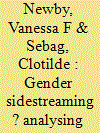

|
|
|
|
|
| Summary/Abstract |
Twenty years after the passing of Resolution 1325, the participation of women as military personnel in peacekeeping operations remains limited. Women currently comprise just under five per cent of military personnel in UN peacekeeping missions, and the UN consistently calls for more. We contend the low numbers of female military personnel in peacekeeping reflects a lack of gender mainstreaming in national militaries globally. This article introduces the problem of sidestreaming, the practice, deliberate or unintentional, of sidelining women and relegating them to specialised spaces in international peace and security while attempting gender mainstreaming or increased gender integration. Drawing on empirical evidence from national militaries we show how and where sidestreaming occurs with the result being that women remain clustered in gendered and low-status spaces in national militaries and in specialised spaces in peacekeeping operations. This has a negative effect on retention and recruitment contributing to the low numbers of female peacekeepers in UN peace operations. We conclude that gender mainstreaming in its fullest sense will require military reform that decouples violence and combat skills from masculinity and inclusive research strategies that engage men as well as women.
|
|
|
|
|
|
|
|
|
|
|
|
|
|
|
|
| 5 |
ID:
180074
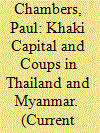

|
|
|
|
|
| Summary/Abstract |
Military-run business activities can turn into an unrestrained form of parasitic capitalism, preying on national economies. The militaries of Thailand and Myanmar have evolved as predatory “khaki capitalist” institutions. Thailand’s military, deriving its legitimacy as guardian of the monarchy, has used that role to justify its accumulation of economic resources. Myanmar’s military, in power for most of the decades since independence, has invoked national security to expand its budget and business interests. Both militaries have repeatedly employed coups to consolidate their economic power, most recently in 2014 in Thailand and 2021 in Myanmar. Fragile democratic governments and international sanctions have proved ineffective in restraining them.
|
|
|
|
|
|
|
|
|
|
|
|
|
|
|
|
| 6 |
ID:
178872
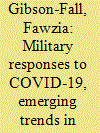

|
|
|
|
|
| Summary/Abstract |
The COVID-19 pandemic is giving way to increases in military engagements in health-related activities at the domestic level. This article situates these engagements amid issues of continuity, change, and resistance in contemporary redefinitions of military health roles. It positions the COVID-19 pandemic as a pivotal moment in global health military practice. I identify three emerging trends within national military responses to COVID-19: (1) Minimal technical military support; (2) Blended civil-military responses; and (3) Military-led responses. The dynamics that underpin each type of military involvement follow context-specific military political legacies. These levels of involvement also relate to national public health approaches and the degree of capacity within health care systems. Each identified trend points towards specific trajectories for the future co-constitution of global and local civil-military engagements.
|
|
|
|
|
|
|
|
|
|
|
|
|
|
|
|
| 7 |
ID:
185889
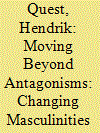

|
|
|
|
|
| Summary/Abstract |
In this paper, I theorize and empirically illustrate how security sector reforms (SSR) can transform violence-centred masculinities in post-conflict militaries. I argue that substantial change of such gender roles depends on challenging the power that is institutionally inscribed into the constructed antagonisms between (1) men and women, (2) fighters and civilians, and (3) perpetrators and victims of violence. A case study on changing masculinities within the Armed Forces of Liberia (AFL) via SSR illustrates this argument. During the violent conflict in Liberia between 1989 and 2003, the AFL infamously perpetrated large-scale violence against civilians, enacting particularly violent forms of masculinity. After the war, the AFL was dissolved and rebuilt with an emphasis on human rights and, partly, gender mainstreaming. Drawing from interviews with multiple stakeholders and practice-theoretical reasoning, the paper renders empirically and theoretically tangible that SSR can change institutional constructions of masculinity by challenging socially constructed antagonisms that give power to men, fighters, and perpetrators.
|
|
|
|
|
|
|
|
|
|
|
|
|
|
|
|
| 8 |
ID:
173813
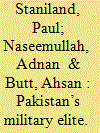

|
|
|
|
|
| Summary/Abstract |
The Pakistan Army is a politically important organization, yet its opacity has hindered academic research. We use open sources to construct unique new data on the backgrounds, careers, and post-retirement activities of post-1971 corps commanders and directors-general of Inter-Services Intelligence. We provide evidence of bureaucratic predictability and professionalism while officers are in service. After retirement, we show little involvement in electoral politics but extensive involvement in military-linked corporations, state employment, and other positions of influence. This combination provides Pakistan’s military with an unusual blend of professional discipline internally and political power externally – even when not directly ruling.
|
|
|
|
|
|
|
|
|
|
|
|
|
|
|
|
|
|
|
|
|